|
|
|
Sort Order |
|
|
|
Items / Page
|
|
|
|
|
|
|
| Srl | Item |
| 1 |
ID:
097066
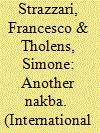

|
|
|
|
|
| Publication |
2010.
|
| Summary/Abstract |
Violent clashes of June 2007 saw Hamas ousting Fatah from the Gaza Strip, thereby making patent the existence of a deep politico-military split within the Palestinian national movement. This article sheds light on the present face of the conflict in the Palestinian territories by adopting a historical-analytical perspective that emphasizes the role played by the availability of small arms and light weapons, as one of the many structural factors that underlie the transformation of the Palestinian struggle. Aware of the essentially contestable and reductionist nature of this endeavor, the authors examine the way in which the weapons acquisition process has changed in the time period from the beginning of the first Intifada in 1987 to the Gaza take-over by Hamas, 20 years later. In doing this, they extend the applicability of existing theories about the correspondence between access to weapons and the changing nature of insurgency, so to better understand a complex case where a national struggle has been spiralling into internecine violence and splintering, in what we may call "another Palestinian Nakba."
|
|
|
|
|
|
|
|
|
|
|
|
|
|
|
|
| 2 |
ID:
133431
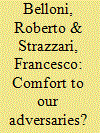

|
|
|
|
|
| Publication |
2014.
|
| Summary/Abstract |
Since the late 1990s international state builders have paid increasing attention to fighting corruption in both Bosnia-Herzegovina and Kosovo. On the surface this effort has brought significant results, since both countries have adopted legal frameworks modelled on the best practices of Western democracies. In practice, however, corruption remains rampant. This disappointing outcome has several explanations: in reviewing the empirical evidence we consider the two countries as cases involving heavily assisted transition from both socialism and war, highlighting how collusive practices between political and criminal interests have played a role in establishing formally liberal but substantively 'hybrid' institutions. We argue that the spread of corruption has been implicitly legitimised by international actors, who have pressured local parties to accept the formal architecture of good governance, including anti-corruption legislation, while turning a blind eye to those extra-legal structures and practices perceived as functional to political stability.
|
|
|
|
|
|
|
|
|
|
|
|
|
|
|
|
| 3 |
ID:
134294
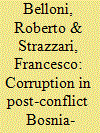

|
|
|
|
|
| Summary/Abstract |
Since the late 1990s international state builders have paid increasing attention to fighting corruption in both Bosnia-Herzegovina and Kosovo. On the surface this effort has brought significant results, since both countries have adopted legal frameworks modelled on the best practices of Western democracies. In practice, however, corruption remains rampant. This disappointing outcome has several explanations: in reviewing the empirical evidence we consider the two countries as cases involving heavily assisted transition from both socialism and war, highlighting how collusive practices between political and criminal interests have played a role in establishing formally liberal but substantively ‘hybrid’ institutions. We argue that the spread of corruption has been implicitly legitimised by international actors, who have pressured local parties to accept the formal architecture of good governance, including anti-corruption legislation, while turning a blind eye to those extra-legal structures and practices perceived as functional to political stability.
|
|
|
|
|
|
|
|
|
|
|
|
|
|
|
|
| 4 |
ID:
178521
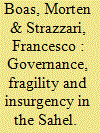

|
|
|
|
|
| Summary/Abstract |
Once a region that rarely featured in debates about global security, the Sahel has become increasingly topical as it confronts the international community with intertwined challenges related to climate variability, poverty, food insecurity, population displacement, transnational crime, contested statehood and jihadist insurgencies. This Special Issue discerns the contours of political orders in the making. After situating the Sahel region in time and space, we focus on the trajectory of regional security dynamics over the past decade, which are marked by two military coups in Mali (2012 and 2020). In addressing state fragility and societal resilience in the context of increasing external intervention and growing international rivalry, we seek to consider broader and deeper transformations that can be neither ignored nor patched up through the framework of the ‘war on terror’ projected onto ‘ungoverned spaces’. Focusing especially on the mobilisation of material and immaterial resources, we apply political economy lenses in combination with a historical sociological approach to shed light on how extra-legal governance plays a crucial role in the deformation, transformation and reformation of political orders.
|
|
|
|
|
|
|
|
|
|
|
|
|
|
|
|
| 5 |
ID:
110236
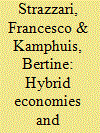

|
|
|
|
|
| Publication |
2012.
|
| Summary/Abstract |
How do informal and criminal economies transform over time, and what are the roles of armed conflict and "postconflict" intervention in this process? Based on four cases of contemporary statebuilding, this article explores the persistence and pervasiveness of extralegal economies in the face of intrusive international intervention and reflects on the implications for state formation. It observes that acting beyond the law is no prerogative of unmodern locals sitting in the antechamber of (liberally assisted) formal processes. The type of hybrid economic governance that emerges from the postconflict convergence of various levels of authority is often characterized by the selective reproduction of extralegal economic practices whose effects go well beyond the informal sector and crime boom typically registered in the immediate aftermath of violent conflicts.
|
|
|
|
|
|
|
|
|
|
|
|
|
|
|
|
| 6 |
ID:
134539


|
|
|
|
|
| Summary/Abstract |
As security continues to be a primary challenge in post-Qadhafi Libya, the availability of weapons to nearby opposition groups and armed insurgencies is a source of major concern for Libya’s neighbours and the international community. Uncontrolled weapons proliferation and the rise of new armed groups have gone hand in hand across various conflict fronts. While what is known about weapons acquisition dynamics does not make it possible to establish a strict causal relationship, by observing variations in the various contexts, critical factors can be identified, such as the emergence of a protection market, the multiplication of tactical options and splintering processes, which facilitate comprehension of how greater circulation of weapons is related to regional volatility and destabilisation.
|
|
|
|
|
|
|
|
|
|
|
|
|
|
|
|
| 7 |
ID:
081571


|
|
|
|
|
| Publication |
2008.
|
| Summary/Abstract |
The article analyses the nexus between illicit economy, violent conflict and peacetime politics in Kosovo. It examines political agendas, client interests and transnational criminal activities, taking into account the interaction between local and international actors involved in peacebuilding. While making sense of emerging trends and regularities, the analysis identifies dilemmas and challenges that counter-crime strategies have to address in Kosovo. The contention is that elements of historical discontinuity are discernible but the global economy remoulds traditional structures, and grey and black market profits give organized crime a formidable opportunity to emancipate itself from the role of service provider, often allowing direct intervention in the management of political violence and in crafting the state-making project
|
|
|
|
|
|
|
|
|
|
|
|
|
|
|
|
| 8 |
ID:
154071
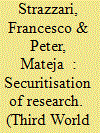

|
|
|
|
|
| Summary/Abstract |
Knowledge on conflict-affected areas is becoming increasingly important for scholarship and policy. This article identifies a recent change in knowledge production regarding 'zones of danger', attributing it not only to the external environment, but also to an on-going process of securitisation of research resulting from institutional and disciplinary practices. Research is increasingly framed by security concerns and is becoming a security concern in itself, although the implications are not readily acknowledged. To illustrate these developments, we draw on fieldwork in Mali and Darfur.
|
|
|
|
|
|
|
|
|
|
|
|
|
|
|
|
| 9 |
ID:
134070
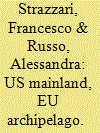

|
|
|
|
|
| Publication |
2014.
|
| Summary/Abstract |
The fight against organized crime has become a top security priority for the European Union (EU). While a new policy area is emerging, it is difficult to understand who is in lead and how the process develops. This article delves into the post-Lisbon EU security model, exploring how Washington and Brussels collaborate in combating organized crime in a context of changing definitions, actors and policies. It argues that US definitions, operational models and policies influence EU institutional thinking and policies, shifting the emphasis from prevention and rule of law to execution and intelligence. The dynamics of policy convergence and divergence on criminal matters in the transatlantic community reflect tectonic shifts in the deepest levels of thinking security in the West, affecting the moulding of a European security identity.
|
|
|
|
|
|
|
|
|
|
|
|
|
|
|
|
|
|
|
|
|